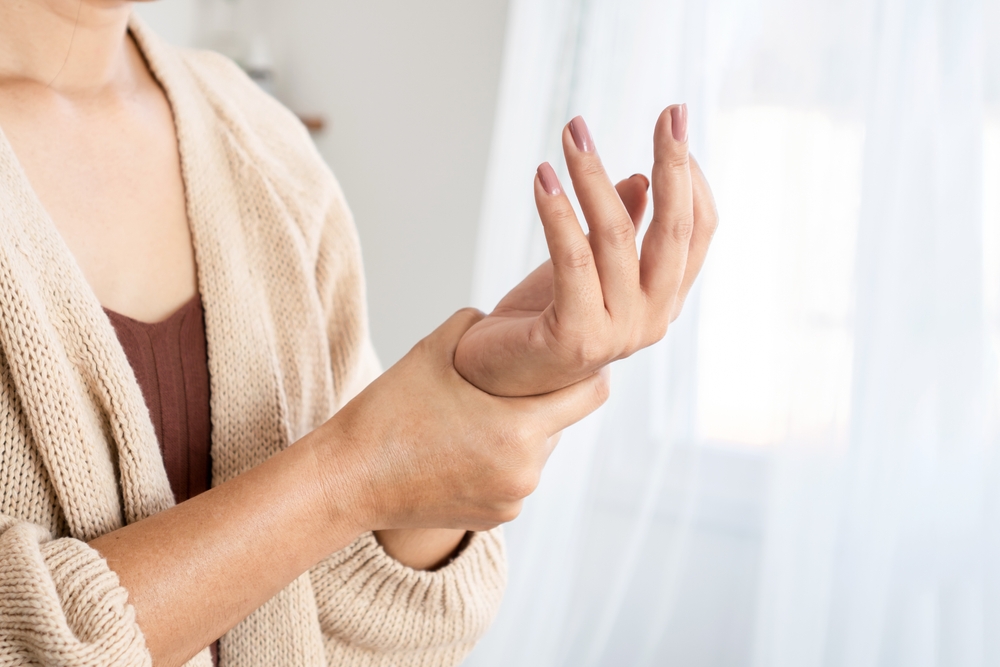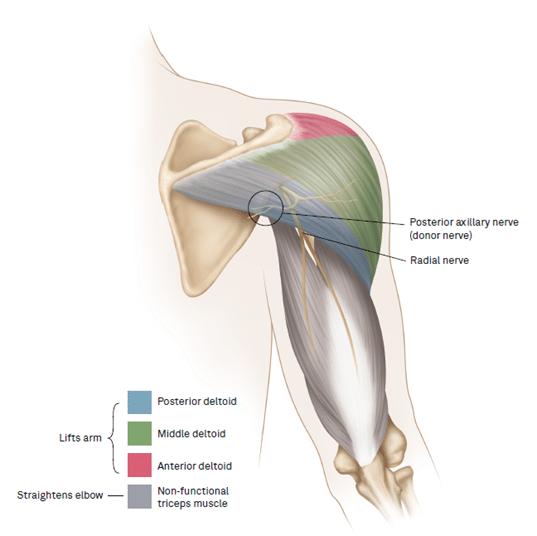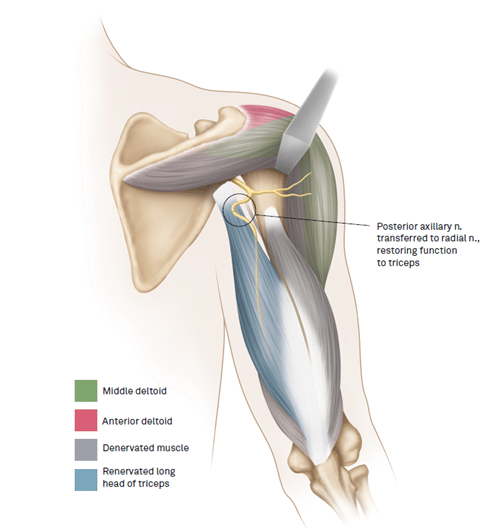
Losing the ability to move your arm or hand can feel overwhelming, but nerve transfer surgery can offer a path forward. By rerouting healthy nerves to restore lost movement, this procedure helps you regain control and reclaim your life.
Fellowship-trained plastic and reconstructive surgeon Dr. Lindsay E. Janes specializes in upper extremity reconstruction, using advanced techniques such as microsurgery nerve transfer.
She combines high-level precision with innovation and personalized care to help patients regain strength, control, and confidence in their daily lives in her Chicago, IL, practice.
How Does Nerve Transfer Work?
Nerve transfer surgery provides a method for restoring function to paralyzed muscles. It involves cutting a healthy, working nerve (often one that’s redundant or less critical) and reconnecting it to the nonfunctional nerve.
This allows the healthy nerve to take over the role of the damaged one and reestablish muscle control.
Dr. Janes performs this procedure using advanced microsurgical techniques, one of her areas of specialization. This expertise is crucial for reconnecting nerves that are only millimeters in diameter, promoting optimal healing and nerve regeneration.
This process enables new signals to reach a paralyzed muscle, allowing it to regain movement over time.
For patients with upper extremity challenges involving the hand, wrist, or arm, nerve transfer may offer life-changing results.


This is an example of a nerve transfer that is performed by borrowing nerve fibers from the shoulder to restore elbow extension in patients with spinal cord injuries.
Candidates For Nerve Transfer
Nerve transfer surgery may be a good option for patients who have reduced movement in their arms or hands due to:
- Brachial plexus injuries
- Peripheral nerve damage
- Spasticity
- Spinal cord injuries (when certain muscles remain functional above the level of injury)
- Nerve injuries that are too severe or too delayed to recover on their own
Nerve Transfer Timing
Timing is important for nerve transfer surgery. Once a muscle has been without nerve input for too long, it may not respond to surgical repair.
Ideally, it should occur within six to nine months of injury for the best chance at full muscle recovery.
However, in some cases, especially after spinal cord injuries, patients may still benefit from nerve transfer even after that window, depending on the extent of nerve damage and muscle condition.
What to Expect from Nerve Transfer Surgery
Dr. Janes creates a customized surgical plan tailored to your specific injury and functional goals. The process begins with a comprehensive evaluation that includes physical exams, nerve studies, and imaging to pinpoint which muscles have lost function and identify healthy donor nerves above the level of injury.
Dr. Janes works with you to explain surgery options and help you establish realistic expectations for the post-surgery period. Her compassion and professionalism make patients feel understood, which enables them to head into surgery feeling confident.
Most nerve transfers are outpatient procedures. Recovery involves rest, followed by occupational therapy to retrain the brain and muscles to function with the new nerve connections. Progress develops over several months, with full results typically achieved within one to two years.
Dr. Janes has extensive training in peripheral nerve and reconstructive surgery, including a competitive fellowship focused on hand and nerve conditions.
She’s committed to understanding what matters most to each patient, whether it’s getting back to work, caring for a child, or returning to a favorite activity. Her warm, collaborative approach empowers patients and supports them at every step.
Nerve Transfer vs. Tendon Transfer
In some cases, patients may benefit from tendon transfer in addition to or instead of nerve transfer. Tendon transfer uses functioning muscles to take over for paralyzed ones. Each approach has benefits and limitations.
Dr. Janes will help determine which method (or combination) is best for your condition and goals.
FAQs
What is nerve transfer surgery?
Nerve transfer surgery is a specialized procedure used to restore movement or sensation when a nerve injury can't heal on its own. Instead of waiting for a damaged nerve to regenerate over a long distance, Dr. Janes redirects a nearby, healthy nerve to take over the function of the injured one. This allows nerve signals to reach the affected muscle or sensory area more efficiently.
When is a nerve transfer recommended?
Nerve transfer may be recommended when nerves are severely injured, torn, or disconnected and unlikely to grow back together naturally. It is commonly used for brachial plexus injuries, certain spinal cord injuries, and other complex nerve injuries that cause ongoing weakness, paralysis, or loss of sensation. This option is often considered when improvement has not occurred within the expected healing window.
How does a nerve transfer work?
During surgery, Dr. Janes selects a functioning donor nerve that controls a less critical movement. That nerve is carefully redirected and connected to the injured nerve closer to the target muscle. Over time, the donor nerve fibers grow into the recipient nerve and resume sending signals. Because the connection is closer to the muscle, recovery can be more reliable than waiting for the original nerve to regenerate.
What is the difference between nerve and tendon transfer?
Nerve transfer and tendon transfer both aim to restore movement, but they work differently. Nerve transfer restores function by reactivating the original muscle through a new nerve connection and relies on nerve regeneration over time. Tendon transfer doesn't depend on nerve healing. Instead, a working muscle and tendon are repositioned to take over the role of a non-functioning muscle. Doctors choose between these options based on the type of injury, timing, muscle health, and functional goals. In some cases, both procedures may be used together.
Who is a good candidate for nerve transfer surgery?
Good candidates have muscles that can still respond to new nerve signals and injuries that fall within a timeframe where nerve regeneration is possible. Dr. Janes uses physical exams, imaging, and muscle and nerve studies (EMG and NCS) to evaluate nerve signaling and muscle response before recommending surgery.
What is recovery like after nerve transfer surgery?
Recovery takes time and patience. Nerves grow slowly, and early movement may not appear for several months. Therapy plays an important role in keeping joints flexible and retraining muscles as new nerve signals return. Continued improvement may occur over a year or longer.
Schedule a Nerve Transfer Consultation in Chicago, IL
If you’ve experienced nerve damage that affects your hand or arm function, don’t wait to start taking your life back. Nerve transfer surgery may be your best opportunity for recovery. Call (312) 695-6022 to schedule a consultation with Dr. Lindsay E. Janes in Chicago.